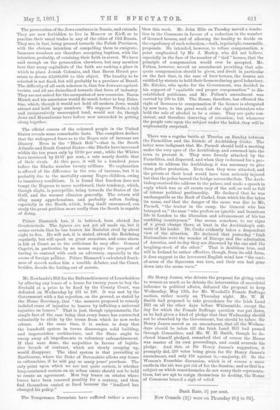There was a regular battle at Thurles on Sunday between
the Parnellites and the friends of Archbishop Croke. The latter were indignant that Mr. Parnell should hold a meeting under the very eyes of the Archbishop, and swarmed into the town to prevent it. They were fiercely attacked by the Parnellites, and dispersed, and when they re-formed for a pro- cession to address the Archbishop, it was necessary to give them police protection. Even then they were attacked, and the priests at their head would have been seriously injured but that the police barred the bridge across the Suir. The Arch- bishop received the address in the palace, and made a speech in reply which was at all events racy of the soil, as well as full of intense political partisanship. He declared that he was unchangeable as the Rock of Cashel, from which his See takes its name, and that the danger of the cause was due to Mr. Parnell, "the traitor in the camp, the General who has betrayed us," the man "who prefers an ignoble and licentious life in London to the liberation and advancement of his too confiding countrymen." One seems, somehow, to see signs of a great change there, at least in the Archbishop's esti- mate of his leader. Dr. Croke evidently takes a despondent view of the situation. He declared that yesterday "Irish Nationalists were the wonder of Europe and the admiration of America, and to-day they are disowned by the one and the laughing-stock of the other." That is doubtless true, and will in Ireland be rather effective, though, from its odd form, it does suggest to the irreverent English mind how "the coat- of-arms of the Squeerses was tore, and their sun had gone down into the ocean wave."






































 Previous page
Previous page